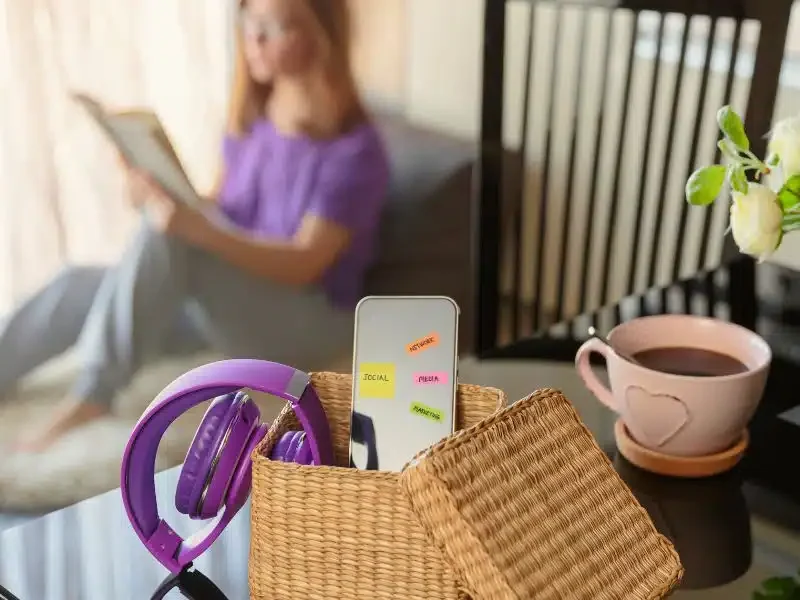In today’s hyper-connected world, the constant influx of information and digital interactions can be overwhelming. While technology offers numerous benefits, excessive screen time can lead to stress, anxiety, and a feeling of being perpetually “on.” A digital detox—deliberately taking a break from electronic devices—can be a powerful way to recharge and reconnect with yourself and the world around you. This guide explores how to unplug and recharge over the weekend effectively.

The Need for a Digital Detox
The Impact of Digital Overload
Constant exposure to digital devices can have several adverse effects, including:
- Mental Fatigue: Continuous engagement with screens can lead to mental exhaustion, making it difficult to concentrate and think clearly.
- Sleep Disruption: The blue light emitted by screens can interfere with the production of melatonin, a hormone that regulates sleep, leading to poor sleep quality.
- Increased Stress and Anxiety: Social media and constant notifications can create a sense of urgency and stress, contributing to anxiety.
- Reduced Physical Activity: Prolonged screen time often means less time spent on physical activities, negatively impacting overall health.
- Decreased Social Interaction: Relying on digital communication can diminish face-to-face interactions, affecting relationships and social skills.
Benefits of a Digital Detox
Taking a break from digital devices offers numerous benefits:
- Improved Mental Clarity: Reduced screen time allows your brain to rest, improving focus and cognitive function.
- Better Sleep: Limiting exposure to screens before bedtime can enhance sleep quality.
- Lower Stress Levels: Disconnecting from the digital world helps reduce stress and anxiety, promoting a sense of calm.
- Increased Physical Activity: Without the distraction of screens, you have more time to engage in physical activities, boosting overall health.
- Enhanced Relationships: Spending time offline encourages meaningful interactions with loved ones, strengthening relationships.
Planning Your Digital Detox
Setting Clear Goals
Before starting your digital detox, define what you hope to achieve. Common goals include:
- Reducing Stress: Unplugging can help lower stress levels and promote relaxation.
- Improving Focus: Taking a break from screens can enhance concentration and productivity.
- Enhancing Relationships: Disconnecting from devices allows more quality time with family and friends.
- Boosting Creativity: Time away from screens can stimulate creativity and inspire new ideas.
Choosing the Right Time
Weekends are ideal for a digital detox because they typically offer more free time and fewer work-related commitments. Select a weekend where you don’t have pressing obligations that require digital communication.
Informing Others
Let friends, family, and colleagues know about your digital detox plans. This way, they won’t worry if you’re unresponsive and can support your efforts.
Preparing for the Detox
Take steps to ensure a smooth digital detox:
- Set Up Auto-Responders: Enable automatic email replies and set up “Do Not Disturb” on your phone to inform people that you’re unavailable.
- Plan Activities: Organize a variety of activities to keep yourself engaged without screens, such as outdoor adventures, reading, or hobbies.
- Create a Comfortable Environment: Prepare your home to be a relaxing, tech-free zone by decluttering and setting up cozy spaces.
Strategies for a Successful Digital Detox
Limit Screen Time Gradually
If a complete detox feels overwhelming, start by gradually reducing your screen time. For example:
- Designate Screen-Free Hours: Set specific times each day, such as during meals or before bedtime, when screens are off-limits.
- Use Apps to Track Usage: Tools like Screen Time (iOS) or Digital Wellbeing (Android) can help monitor and limit your screen time.
Establish No-Phone Zones
Create areas in your home where digital devices are not allowed, such as:
- Bedroom: Keeping devices out of the bedroom can improve sleep quality.
- Dining Area: Making mealtimes device-free encourages mindful eating and better conversation.
- Living Room: Designate this space for relaxing and socializing without screens.
Engage in Offline Activities
Fill your weekend with engaging offline activities:
- Outdoor Adventures: Spend time in nature by hiking, biking, or exploring local parks.
- Exercise: Join a fitness class, practice yoga, or go for a run.
- Reading: Dive into a good book or explore new genres.
- Hobbies: Revisit old hobbies or try new ones, such as painting, gardening, or playing an instrument.
- Socializing: Plan face-to-face interactions with friends and family, like a game night or a picnic.
Practice Mindfulness and Meditation
Incorporate mindfulness practices to enhance your digital detox:
- Meditation: Set aside time each day to meditate and focus on your breath, helping to calm the mind.
- Journaling: Reflect on your thoughts and feelings in a journal, promoting self-awareness and emotional well-being.
- Mindful Walking: Take walks without any digital distractions, paying attention to the sights, sounds, and sensations around you.
Reflect and Reevaluate
At the end of your digital detox, take time to reflect on the experience:
- How Do You Feel? Notice any changes in your mood, stress levels, and overall well-being.
- What Did You Enjoy? Identify which activities brought you joy and relaxation.
- What Did You Learn? Consider what insights you’ve gained about your relationship with technology and how you can maintain a healthier balance going forward.
Maintaining Digital Balance After the Detox
Set Long-Term Boundaries
To maintain the benefits of your digital detox, establish long-term boundaries:
- Regular Digital Breaks: Schedule regular digital detoxes, such as one day each week or a few hours each evening.
- Screen Time Limits: Continue to use screen time tracking tools to monitor and limit your usage.
- No-Phone Zones: Maintain device-free areas in your home to encourage ongoing tech-free time.
Prioritize Offline Activities
Make offline activities a regular part of your routine:
- Daily Exercise: Incorporate physical activity into your daily schedule, whether it’s a workout, a walk, or a yoga session.
- Hobbies and Interests: Dedicate time each week to pursue hobbies and interests that don’t involve screens.
- Social Connections: Plan regular in-person gatherings with friends and family to strengthen your relationships.
Mindful Technology Use
Adopt mindful technology habits to ensure a healthier relationship with your devices:
- Purposeful Use: Be intentional about when and why you use your devices. Avoid mindless scrolling and set specific goals for your screen time.
- Notification Management: Turn off non-essential notifications to reduce distractions and interruptions.
- Tech-Free Times: Designate certain times of the day, such as during meals or before bed, to be completely tech-free.
Self-Reflection and Adjustment
Regularly assess your digital habits and make adjustments as needed:
- Monthly Check-Ins: Conduct monthly check-ins to evaluate your screen time and overall tech use.
- Adjust Goals: Based on your reflections, set new goals and boundaries to maintain a healthy balance.
- Stay Flexible: Be adaptable and willing to adjust your digital habits as your lifestyle and needs evolve.
Conclusion
A digital detox over the weekend can be a powerful way to unplug and recharge, offering numerous benefits for your mental and physical well-being. By setting clear goals, preparing in advance, and engaging in offline activities, you can successfully disconnect from the digital world and reconnect with yourself and those around you. Maintaining a balanced approach to technology use after your detox will help you continue to reap the benefits and lead a healthier, more mindful life. Remember, the key is not to eliminate technology entirely but to use it in a way that enhances, rather than detracts from, your overall well-being.










